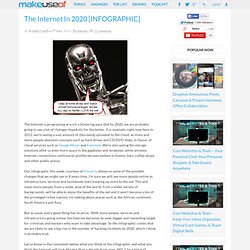

South Korea unveils robotic prison guards, promises futuristic cavity searches. Hologram Creator Explains How a $400,000 Tupac Came To Be. Un robot qui grimpe les escaliers comme un humain. INFOGRAPHIC : The Internet In 2020. The Internet is progressing at such a blistering pace that by 2020, we are probably going to see a lot of changes, hopefully for the better.

For example, right now here in 2012, we’re seeing a vast amount of data being uploaded to the cloud, as more and more people abandon concepts such as hard drives and CD/DVD disks, in favour of cloud services such as Google Music and Evernote. We’re also seeing file storage solutions offer us even more space in the gigabytes and terabytes, while wireless Internet connections continue to proliferate everywhere in homes, bars, coffee shops and other public places.
Our infographic this week, courtesy of Visual.ly, shows us some of the possible changes that we might see in 8 years time. I’m sure we will see more people online as infrastructure, services and businesses start hooking up more to the net. But as usual, every good thing has its price. Click on the infographic for a larger version. Here's How Robots Will Save Our Lives in the Future. Singularity Hub Accelerated Tech News - Robots Wearing Google Glasses go to Mars? Les fichiers les plus téléchargés sur Hotfile sont… des programmes Open Source. Après Megaupload, c’est au tour du service de partage de fichiers Hotfile d’être en ligne de mire de l’industrie culturelle américaine.

Cette dernière accuse Hotfile de promouvoir le piratage à grande échelle et exige la fermeture du service de partage en ligne. Un procès a été ouvert et la MPAA a engagé un expert affirmant qu’en effet, 90% du contenu disponible sur Hotfile est en infraction avec les lois sur la propriété intellectuelle. Hotfile a à son tour engagé un expert professeur à l’Université de Duke et, bizarrement, il n’arrive pas du tout aux mêmes conclusions que son cher collègue payé par l’industrie cinématographique américaine ^^ Premièrement, l’expert engagé par Hotfile a démontré pourquoi le rapport commandité par la MPAA n’était pas fiable, qu’il était basé sur des méthodes non-scientifiques pour abonder dans le sens de l’association américaine chargée de défendre les intérêts de l’industrie cinématographique américaine.
Source. Asimov's robots live on twenty years after his death. Renowned author Isaac Asimov died 20 years ago today. Although he wrote more than 500 books, the robot stories he began writing at age 19 are possibly his greatest accomplishment. They have become the starting point for any discussion about how smart robots will behave around humans. The issue is no longer theoretical. Today, autonomous robots work in warehouses and factories. South Korea plans to make them jailers. Several nations, notably the United States, South Korea, and Israel, operate military drones and autonomous land robots. Robots were still new when Asimov began writing about them in 1939. Asimov preferred stories that portrayed robots sympathetically. "I didn't think a robot should be sympathetic just because it happened to be nice," he wrote in a 1980 essay.
That idea infused Asimov's first robot stories. Like most things Asimov wrote, the Three Laws were clear, direct, and logical. In "Liar," a telepathic robot lies rather than hurt people's feelings.